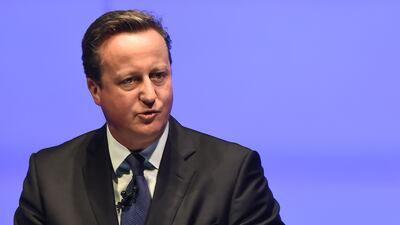Former British prime minister David Cameron has suggested that Britain made a mistake in leaving the European Union, but insisted calling a referendum was the right thing to do.
Mr Cameron indicated the UK should now look to the future and be "good neighbours" after being "unhappy tenants" within the EU.
The former prime minister, who resigned the morning after the referendum, told an audience at the Abu Dhabi Ideas Weekend: "“I think we have taken the wrong turn."
The two-day event, held at NYU Abu Dhabi, seeks to facilitate the sharing of ideas to tackle global challenges.
Mr Cameron was speaking during a session on the polarisation that has gripped developed societies in recent years, bringing about the Brexit vote and the election of US President Donald Trump.
______________
Brexit
Tony Blair calls Brexit ‘a mistake of destiny’ in plea to EU for reform
Britain's parliament should have free vote to reject Brexit - former PM Major
Blair to EU: Brexit is your problem, too, help us avoid it
______________
In a session entitled “Bridging the Gaps”, Mr Cameron, who campaigned fervently to remain in the EU after personally calling the referendum, argued that the wounds of the 2008 global financial crisis had in part led to the Brexit vote.
“There was genuine concern about international organisations that needed to be addressed,” he said. “That’s what we did.”
He said the situation had been “unsustainable”, making a referendum inevitable.
He also spoke of the need to “do better on controlling immigration”.
Nevertheless, the former leader stressed the need for close economic ties between Britain and the trading block he called “the biggest single market in the world”.
“We were always unhappy tenants,” he said. “Now we have to be happy and contented neighbours.”
The UK government is currently embroiled in tough negotiations with EU representatives over the future of the relationship, as it disentangles itself from the bloc after 43 years of membership.
Mr Cameron, who stood down after six years in office in the immediate aftermath of the 2016 vote, touched on various other issues during his half-hour discussion with Rima Al Mokarrab, executive director of strategic sffairs at the Executive Affairs Authority.
On tackling terrorism and extremism, he criticised those on the left who argue that the West has caused Islamic extremism and those on the right who point to a “clash of civilisations”.
The key, he argued, is to join up with moderate forces and defeat those like ISIL with “poisonous” and “twisted” views.
He extolled the virtues of democracy and the rule of law.
“Democracy is having a bad decade, but it is having a good century,” he said, arguing that institutions and the rule of law in the United States were standing up to Mr Trump.
Mr Cameron concluded the session on polarisation, which also included his former campaign manager Sir Lynton Crosby, with a message of hope.
Lynton Crosby comment: In the pessimistic West, an aura of negativity feeds into a growing political divide
“It is wrong to say that we can’t build a harmonious society,” he said. But “it won’t work unless we win the overall argument against the forces of darkness that say you can’t have a multiracial diverse society. You can. We’re doing it.”
In life after politics, Mr Cameron has thrown himself into the fight against dementia. He chairs a commission to support fragile nation states and is setting up a UK-China investment fund.
Mr Cameron is joined at Abu Dhabi Ideas Weekend by his former French counterpart, Nicolas Sarkozy, and Noura Al Kaabi, UAE Minsiter of Culture and Knowledge Development.

